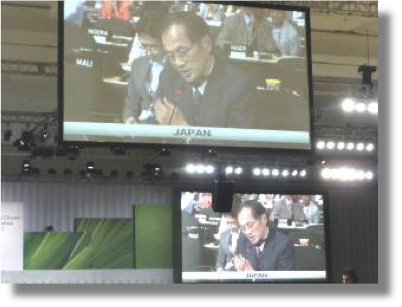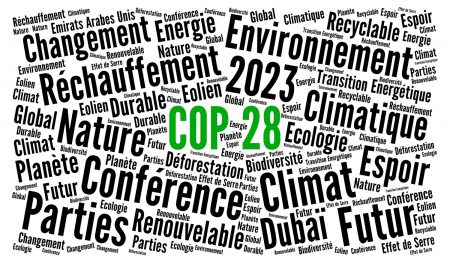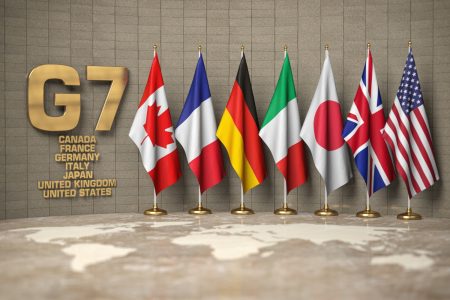私的京都議定書始末記(その38)
-初日のステートメントとその波紋-
有馬 純
国際環境経済研究所主席研究員、東京大学公共政策大学院特任教授
初日のステートメント
今、私の目の前にAWG-KP初日行ったステートメントの原稿がある。ここにその全文を掲載したい。
Thank you, Mr.Chairman,
We are tackling global warming issues. Global issues need global solution. We should recognize that we are not living in the year 1997. When the Kyoto Protocol was crafted in 1997, it was supposed to cover 56% of global CO2 emissions under obligation. However, due to the withdrawal of the US from the Kyoto Protocol and rapid increase of the GHG emissions in emerging economies, its coverage of emissions under obligation is merely 27% and will further decline in the coming years. Under such radical change of circumstances, it is obvious that setting caps on a small part of global emissions under the Kyoto Protocol can never be effective vehicle in tackling global warming in coming years, while acknowledging its historical role.
On the other hand, the countries which have associated with the Copenhagen Accord cover 85% of the global CO2 emissions. It is obvious that the Copenhagen Accord is the point of departure towards truly effective global framework.

That is why Japan is aiming at an early adoption of a new single legally binding instrument constituting a fair and effective international framework with the participation of all major emitters based on the Copenhagen Accord.
Unfortunately, it is not likely that we could adopt such a single legally binding document at Cancun. Therefore, Japan is aiming at a balanced COP decision package covering all major elements respecting a delicate balance in the Copenhagen Accord. Cancun should present a milestone towards the ultimate goal. We strongly expect that the negotiation at the AWG-LCA would make a tangible progress to this end.
Mr.Chairman,
Japan has been participating in the AWG-KP with an expectation that some elements such as the rules for LULUCF, baskets and market mechanisms could provide useful components to a broader outcome. In this respect, there has been some progress in these areas. Further progress on these issues would certainly provide useful inputs to the packaged outcome here in Cancun and we will actively contribute to this end.
On the other hand, we should recognize that so-called “number” issue is in a complete stalemate. This is not surprising since the number issue is only a part of broad picture. Almost all the pledges by the Annex I Parties under the Copenhagen Accord are premised to the establishment of a fair and effective global deal engaging all major emitters including the US and major developing countries. This means that global mitigation efforts by both developed countries and developing countries can only be addressed in the AWG-LCA.
Mr.Chairman,
Today, we have heard many statements from developing country partners calling for cementing the 2nd commitment period of the Kyoto Protocol. Japan reiterates its firm position that our 2020 target has been pledged under the Copenhagen Accord. Japan is not in a position to inscribe our target in the Annex B of the Kyoto Protocol under any condition or circumstances. This is because Japan is aiming at a truly effective global deal. Kyoto 2nd commitment period will never constitute a fair and effective single framework with the participation of all major emitters, which we are aiming at.
There is an argument that we should keep all the options open, not prejudging any legal outcome of the on-going negotiation. It is understandable approach under the current non-convergence on this issue. For this very reason, we will never accept any CMP decision implying the setting of the 2nd commitment period or provisional extension of the 1st commitment period since this itself will prejudge the legal outcome.
Mr.Chairman,
Japan also reiterates its determination to achieve 6% reduction target under the Kyoto 1st commitment period. Moreover, as our own initiative, Japan will further enhance its mitigation efforts through green innovation aiming at the “world’s top environment and energy power”.
Japan is also determined to take a lead in assisting developing countries. Japan committed 15 billion dollars of fast-start financing to developing countries in 3 years and has already delivered 7.2 billion dollars as of the end of September. Japan supports establishment of the Copenhagen Green Fund and is willing to participate in the preparatory work to this end, which is premised to the progress on mitigation actions and MRV by developing countries. Japan is also willing to make an appropriate contribution to the long-term finance beyond 2013 premised to ensuring necessary financial sources and in accordance with other countries’ preparedness.
In addition, Japan intends to promote bilateral and regional cooperative activities engaging private sector with a view to supporting mitigation actions and MRV by developing countries.
Mr.Chairman,
My intervention has covered much broader perspective compared with the mandate of the AWG-KP. However, it should be born in mind that this comprehensive scope, namely, mitigation by both developed and developing countries and financial and technical support to developing countries is the key for a successful outcome of the on-going negotiation. Discussion solely focusing on the 2nd commitment period will not to anywhere.
Japan strongly hope that the whole negotiation in Cancun will make a good and balanced progress towards a fair and effective international framework engaging all major emitters.
Thank you.
私のこのステートメントのうち、Japan is not in a position to inscribe our target in the Annex B of the Kyoto Protocol under any condition or circumstances のくだりが、その後、NHKその他のニュースで何度も放映された。あたかも私がそれしか言わなかったように映ったかもしれないが、日本が全ての国が参加する枠組みを重視していること、途上国支援においてもイニシアティブをとっていること、日本としては前向きに交渉に貢献するつもりであること等、もっと広範なテーマに触れていたつもりである。だからこそ狭いアジェンダのみに拘泥するAWG-KPで言う必要があったのだ。
発言を終えると議場に沈黙が流れた。これまでの発言、特に途上国代表の発言についてはその都度、拍手がわいていたのとは対照的である。拍手など、はなから期待していなかったし、25%目標を発表して拍手を受けたときよりも余程気分は良かった。タバコを吸いに議場の外に出ようとしたところ、ニュージーランドのジョー・ティンダール大使から小声で呼び止められ、「You are brave!」と言われた。
AWG-KPプレナリーは、いつものように先進各国・先進国全体の削減幅(ナンバー)、LULUCF、温室効果ガスの範囲等、メカニズム、対応措置の5つのグループに分かれて議論することを決めて散会した。会場を出しなに、顔見知りの日本の環境NGOの人から「説得力のあるステートメントでしたね」と言われた。環境NGOの方から褒めていただくことは余りないので、「有難うございます」とお礼を言って別れた。しかし翌日からが大変だった。
















